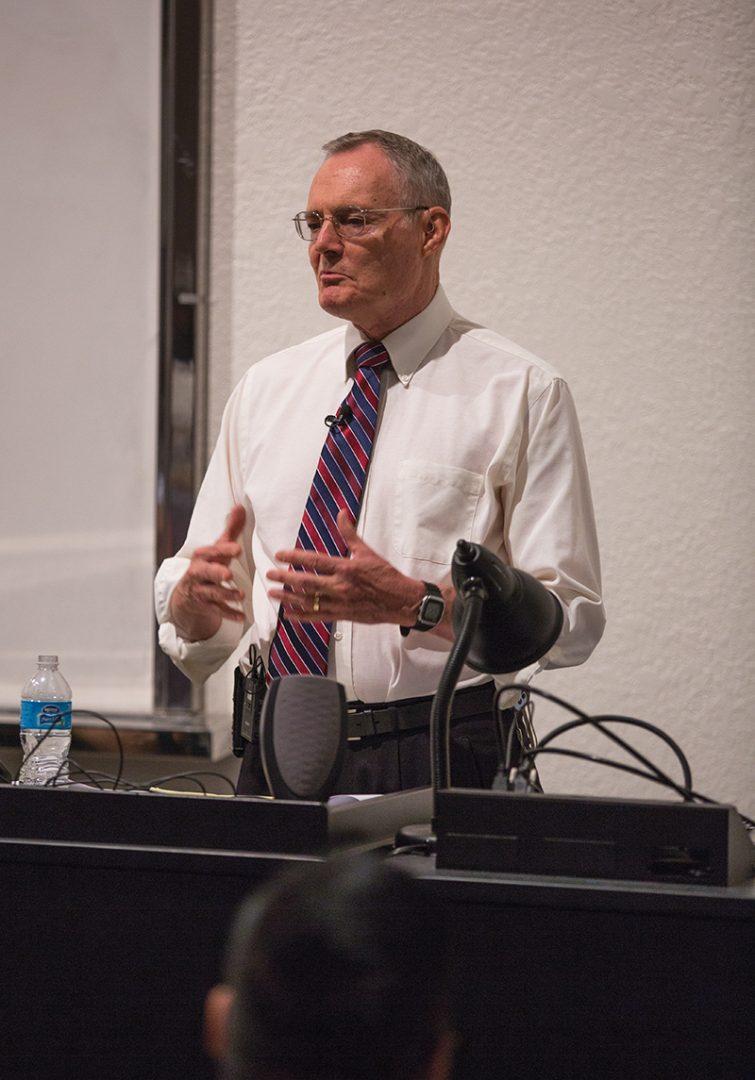
Dr. Alfred Evans, a professor emeritus of political science at Fresno State, spoke on the Supreme Court’s recent highly-publicized Hobby Lobby decision calling it a victory for religious freedom during a Thursday night ethics lecture.
The lecture was hosted by the Ethics Center at Fresno State as part of a series that started on campus in 2008 to promote understanding and discuss contemporary ethical dilemmas.
Evans, a long-term professor at Fresno State, is a board member of the Interfaith Alliance of Central California.
In the Burwell v. Hobby Lobby case, the Supreme Court ruled in favor of Hobby Lobby founder David Green and Conestoga Wood Specialties, a Mennonite family-owned operation, that challenged a contraceptive mandate by the U.S. Department of Health and Human Services under the Affordable Care Act.
The argument was against the provision of four specific contraceptive devices approved by the FDA that both the Green and Hahn families said may prevent the implantation of a fertilized egg and constitute abortion, which goes against both families’ religious beliefs.
Evans spoke briefly about the history and precedents of the Hobby Lobby case to clarify the process of decision making within the Supreme Court, including the Religious Freedom Restoration Act, which required strict scrutiny in determining when a neutral law inflicts or “substantially burdens a person’s exercise of religion.”
“This case was decided completely on the Religious Freedom Restoration Act of 1993, and it’s a very common practice for justices,” Evans said. “They go with interpreting the law as a form of self-limitation. What the court distinguished in this case was between belief and action in interpreting the free exercise clause. Freedom of belief is virtually absolute.”
Evans also noted that this case helped to reestablish the Sherbert test from the Sherbert v. Verner case of 1963, which demonstrated the necessity to limit government impositions based on two main criteria and reinforcing the free Establishment Clause of the First Amendment.
“Really what it did was to reinstate the Sherbet test,” Evans said. “If you are going to impose a substantial burden, you have to have a compelling interest for doing so, and it has to do so with the least restrictive means.”
The Supreme Court decided that the government was not acting within the least restrictive means, and had their own interest in providing access to contraceptives to the public.
The issue that emerges from the decision, Evans noted, lies in the scope of religious liberty — which religious rules could be established or approved by the court and which could not — creating the potential for favoring one religion above another, as noted in the dissenting opinion of Justice Ruth Bader Ginsburg.
“Approving some religious claims while deeming others unworthy of accommodation could be perceived as favoring one religion over another, the very risk the [Constitution’s] Establishment Clause was designed to preclude,” Ginsburg said.
While Evans could not determine an easy resolution to the issues that will result from the landmark decision, he argued it was a victory for religious freedom in the United States.
“One thing that we see is that the court changes over time. The viewpoint of the court in 1978 is not the viewpoint in 1963 or 1990,” Evans said. “What evolution has gone on is change in the role of religion and politics, change in the demand of various groups in the political sphere, so it will be interesting to see how that develops.”
Dr. Andrew Fiala, director of the Ethics Center and philosophy department chair at Fresno State, spoke about the magnitude of the case and implications for every American.
“Everyone who’s religious, I believe, should think that religious liberty is important, because we don’t want the state intruding on religion,” Fiala said. “This case changes the dynamic of religious liberty a bit, so all religious people should be interested in the case, not just folks opposed to abortion or hobby lobbyists.
“It’s an important effort to try to bridge the gap between Jews, Muslim, Christians and so on to all sit down together and talk about what they have in common, that’s peace-that’s the way forward.”






Jessica Wilharms • May 25, 2017 at 8:17 am
Currently researching the ethics of Hobby Lobby for a paper and this article was extremely helpful!